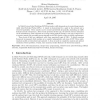Free Online Productivity Tools
i2Speak
i2Symbol
i2OCR
iTex2Img
iWeb2Print
iWeb2Shot
i2Type
iPdf2Split
iPdf2Merge
i2Bopomofo
i2Arabic
i2Style
i2Image
i2PDF
iLatex2Rtf
Sci2ools
104
click to vote
EOR
2008
2008
Rerouting tunnels for MPLS network resource optimization
In Multi-Protocol Label Switching (MPLS) networks, traffic demands can be routed along tunnels called Label Switched Paths (LSPs). A tunnel is characterized by a path in the network and a reserved bandwidth. These tunnels can be created and deleted dynamically, depending on traffic demand arrivals or departures. After several operations of this type, the network resource utilization can be unsatisfactory, with congestion or too long routing paths for instance. One way to improve it is to reroute tunnels; the rerouting process depends on the LSP Quality of Service (QoS) requirements. Three levels of QoS are considered, with three associated types of LSPs. A global rerouting framework is proposed, which enables us to consider independently each type of LSP. Then, mathematical models are introduced and analyzed. A focus is made on complexity analysis and optimal resolution of these problems. Finally, some numerical results illustrate the theoretical analysis.
Related Content
| Added | 10 Dec 2010 |
| Updated | 10 Dec 2010 |
| Type | Journal |
| Year | 2008 |
| Where | EOR |
| Authors | Olivier Klopfenstein |
Comments (0)

